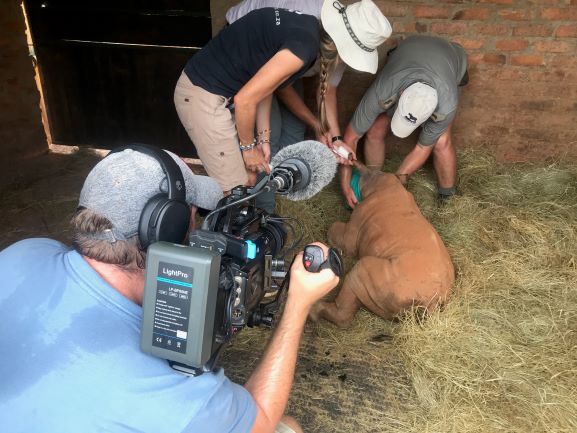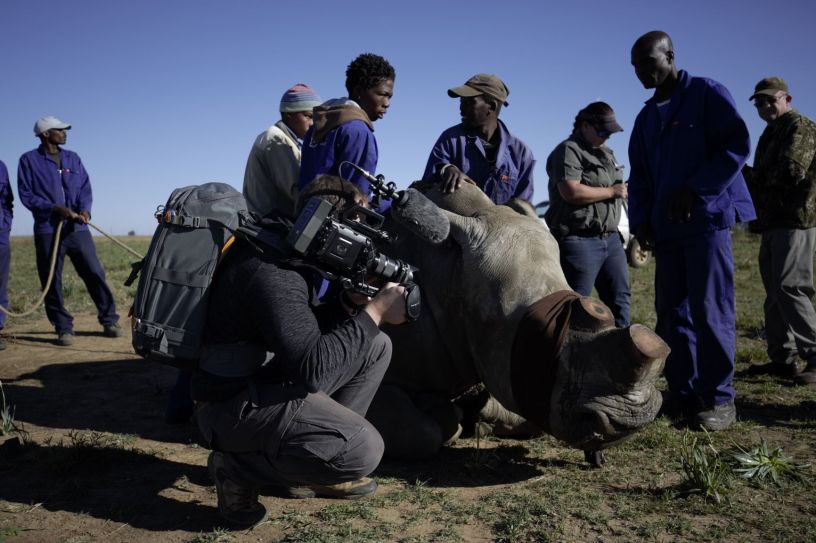Perth’s post-production sector has assisted with an investigative documentary that is provoking strong reactions from global audiences.
Filmed across three years, The Last Horns of Africa offers an intimate look at the current rhino poaching war raging across Africa through the journeys of two conservationists who risk their lives to protect the rhino in their care. The film also examines the top-secret, covert operation to bring down South Africa’s most notorious rhino poaching syndicates, and the illicit rhino horn deals they facilitate.
Garth De Bruno Austin’s directorial debut features never before seen footage of South Africa’s largest undercover wildlife investigation, including police raids and the arrest of a poaching kingpin.
The project has strong connections to Australia via producer Morgan Pelt and editor Jonathan Rowden, both of whom reside in Perth.
The city housed the entire post-production of the film, with Soundbyte Studios completing the sound mix, and the final mix being completed at Backlot Perth, where it had a limited theatrical run this month.
Backlot Perth operator Ian Hale is also giving the film a release at the Luna Leederville this weekend via his boutique distribution company Halo Films.
It comes after the documentary had its Australian premiere at this month’s Revelation Film Festival.
Speaking to IF, De Bruno Austin said the final stages of the film had been “figured out along the way”.
“We didn’t know at the beginning because as we were filming, we didn’t know what we were going to do with it,” he said.
“When we started, we didn’t quite know if I would cut it, or whether we would find an editor.
“Luckily, we met some amazing people in Perth that put us in touch with Jonathan Rowden and [composer] Sean Tinnion, which was when we decided to do it all here.
“It was just the best decision we made because the team we had to finish this was awesome.”
The film had its virtual world premiere at the EarthxFilm festival in April, where it received an Impact Award.
Since then, one of the alleged rhino poaching kingpins the film focuses on has been shot dead, gunned down in a hail of heavy calibre bullets in Hazyview, South Africa.
Petrus Mabuza had previously been the subject of an investigation from South African police detective Lt.-Col. Leroy Bruwer, who was shot dead while on his way to work in March of last year.
De Bruno Austin said the death of the alleged kingpin made any sense of closure harder.
“It’s a bit unfortunate because if you have a country like South Africa, which has a lot of issues, the one thing you want to work is the democracy and the court systems to function properly so that the country can function,” he said.
“This type of street justice is not a good thing.”

Pelt said a lot of people outside of conservation didn’t realise how pressing the issue of rhino poaching was.
“They’re sort of shocked by the end [of the film]) that it’s still this relevant and this current,” she said.
“Even though the film took more than four years, it’s just as bad as it was when we started making it.”
The film’s message is set to reach a wider audience in the coming months, having been selected to screen at the Wildlife Conservation Film Festival in New York at the beginning of October.
International distribution company Off the Fence, which produced My Octopus Teacher, has also been lined up to negotiate a streaming release.
Pelt said a common thread to the response of audiences so far had been a feeling of hope.
“We’ve had some amazing questions after the film, especially from people who ask what they can do to help with rhino poaching being a South African issue,” she said.
“We say please help Care for Wild Rhino Sanctuary, which is one of the organisations we feature in the film that is run by Petronal Nieuwoudt and also we recommend people travel to South Africa and spend tourism dollars when the borders reopen.”
The Last Horns of Africa will screen at the Luna Leederville until August 1.


